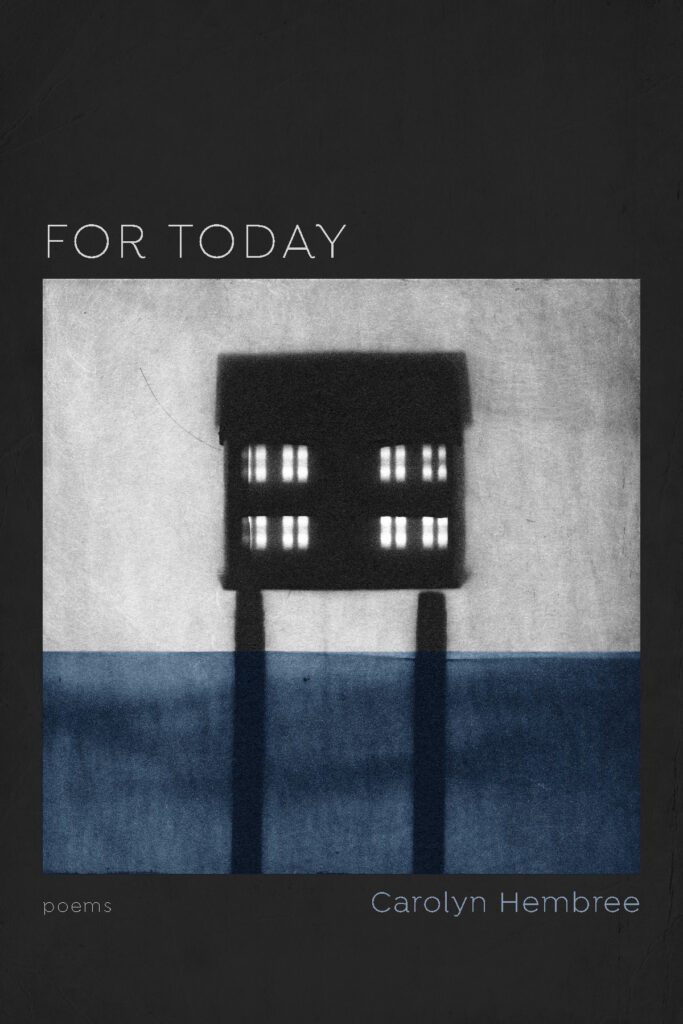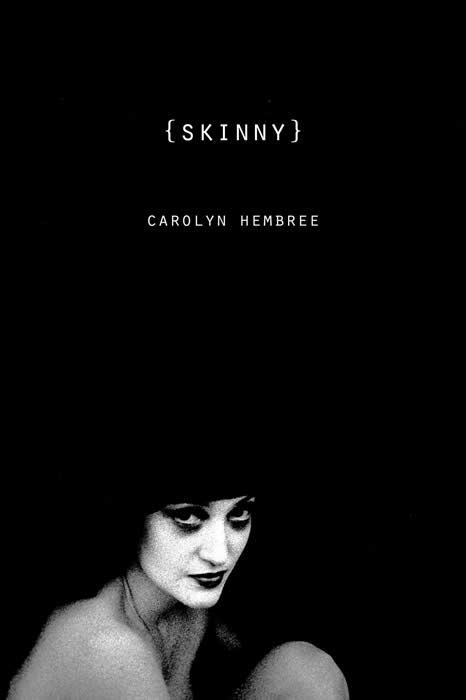Books
For Today
2024 • LSU Press
Runner-up for the Poetry by the Sea Book Award
Finalist for the Eric Hoffer Book Award Finalist
A revelatory collection of poems set in the Gulf South, Carolyn Hembree’s For Today chronicles the experience of a woman who becomes a mother shortly after her father’s death and struggles to raise her child amid private and public turmoil. Written in closed and nonce forms that give way to the field composition of the maximalist title poem, the work explores grief, rage, and love in a community vulnerable to Anthropocene climate disasters. Through relationships with her daughter, neighbors, friends, ancestors, other poets (living and dead), and the earth, the speaker is freed to accept and celebrate her own perishability.
Reviews & Interviews
- Gulf Coast Magazine (review by Marshall Woodward)
- Ten Remarkable Small Press Titles (review by Han VanderHart)
- Tupelo Quarterly (interview by Tiffany Troy)
- Hunger Mountain (interview by Annelise Schoups)
- Gigantic Sequins (review by Dustin Pickering)
- The Piker Press (review by Peter Mladinic)
- Erato (review by Tomas Maldonado)
- New Delta Review (review by Parker Logan)
- Bear Review (interview by Nikki Ummel)
- Sitting in Silence (interview by Maurice Carlos Ruffin)
- Annulet (review by Burnside Soleil)
- Deborah Kalb Books (interview by Deborah Kalb)
- Speaking of Marvels (interview by Will Woolfitt)
- Columbia Daily Tribune (article by Aarik Danielsen)
- Caesura Presents (interview bv John Sibley)
- Seneca Review (review by Lisa Pasold)
- Delta Poetry Review (interview by Susan Swartwout; review by Stephen Furlong)
- Fahmidan Journal (review by A. R. Arthur)
- New Orleans Review (review by Susan L. Leary)
- Trampoline Magazine (review by Justin Lacour)
- Of Poetry Podcast (interview by Han VanderHart)
- French Quarter Journal (interview by Skye Jackson)
- Louisiana Life (review by Christopher Louis Romaguera)
- Country Roads (article by Sophie Nau)
- Tupelo Quarterly (review by Henk Rossouw)
- Arizona Poetry Center (interview by Stacey Balkun)
Praise for For Today
Carolyn Hembree’s collection, FOR TODAY, is stunning in its range and formal dexterity, weaving together the loss of the speaker’s father with the arrival and anxieties of motherhood. Again and again, the poems in this book seem to insist, like the speaker in the opening sonnet crown: “I won’t be put down.” Hembree dazzles with a villanelle, a short series of haiku, an evocation of Chaucer and the plague in the 2020 pandemic, and her poems all speak to the amazement and strangeness of what she calls in the final long poem, the “world at large, world at home.” The titular poem is a breathtaking tour de force––refusing received forms and creating its own. Meditatively reminiscent of the FOUR QUARTERS and spanning 60 pages, “For Today” explores what it’s like “to pull oneself like an arm through / the open sleeve of the poem’s life,” and to live with grief, with love for a child in a world of school shootings and recurring losses, with spring flowers and other wonders that need to be named. FOR TODAY is a singular and deeply moving work.
Chelsea Woodard
I don't think I can fully express how much I love "For Today," the brilliant long poem by Carolyn Hembree. I can tell you it's a masterpiece. That's true. I can tell you it's not really like anything you've read before, that it is perfectly written, that it is profoundly moving (and joyful, and funny, and strange)--all true. But none of that really captures what I love about it: its thoroughgoing vulnerability, its extraordinarily brave and profound commitment to the full range of meanings in its title, its mysteries, the intimate and immersive experience it offers of self in place and time. It is that rare thing: a work of genius that springs from the writer's heart to fill up yours.
Brad Richard
Imagine a crown of sonnets that juxtaposes an elegy for one’s father with the overwhelm of a newborn— and then, the Violent Femmes cannonball in. In this electrifying collection, Carolyn Hembree ricochets between formal tradition and the teeming, robust soundtrack of the contemporary mind: ‘O streetcar’s / O horn’s O baby’s fugal ken.’ Prose poems channel the turbulence of worry and violence—and then, ‘Funk Hour, done thunk enough hour.’ The anchoring, longform title poem updates the flâneur tradition by activating a nimble, rangy sidewalk tour that moves with quirky visual logic across the page and offers a Whitmanesque set of lush declarations. The narrator plays word games with her daughter, Kiddo, while her thoughts are equally in turn with a friend grappling with cancer; eros and thanatos in meta-tango. In For Today, P is for praline, ping, pamphlet, parrot, proselytize, postscript, plantain, pavement, patterns, peacock. P is for damn fine poetry.
Sandra Beasley
Carolyn Hembree’s For Today is a stunning collection that explores what it means to be a mother, daughter, friend, and a citizen of the world. Hembree’s poems dazzle with vivid language and an electric array of forms. The long poem from which the collection takes its title is simply spectacular, mapping a city, mind and spirit. This is a book that investigates self and enlarges the world, a book that demands our attention.
Nicole Cooley
For Today is a sensuous, extended meditation on intergenerational succession: the perils and ecstasies of raising a child in a time of dying parents, of trying to care for dying parents while raising a child. Inger Christensen is Hembree’s day-sign here, and Rilke her night-sign, but the title poem is very much its own achievement, one of the most ambitious long poems in recent American poetry. It is an extraordinary testimony of resilience, troubled immanence, and the ferocity of love.
G. C. Waldrep
The long poem ‘For Today’ is a brilliant, existential tour de force. I read it in one sitting. I couldn’t stop. And it gives me that sense that I experience with the very best poems, that I’m not reading them so much as living them.
Rodney Jones
A high-voltage talent, Hembree harnesses the fevered elements of what’s given—fraught landscape, fraught heart—because to do otherwise is to live (and write) a lie that denies love its innately fuguelike truth. These poems spun my reading swiftly into awe.
Katie Ford
Startling poems. A wondrous recreation of form.
Toi Derricotte
Carolyn Hembree’s For Today is a wild ride of formal innovation, odes, and elegies. Any reader would be taken with the poet’s modified sonnet crown, her villanelle, her prose poems, and the musical opus that is the gorgeously long title poem. But I am most impressed by how Hembree manages all of this while also daring to write a poetry so sharp and bare it aims at nothing but the heart. It takes something more than artistic honesty to write, “I hope my student was too drunk to feel himself drown” in a poem about the aftermath of Katrina. In many ways, yes, this book about mothers and motherhood nurtures as much as it chides and challenges.
Jericho Brown
Rigging a Chevy into a Time Machine and Other Ways to Escape a Plague
2016 • Trio House Press
Winner of the Trio Award
Winner of the Rochelle Ratner Memorial Award
Every once in a great while, a writer appears whose style, subject, and voice are like no other, so far outside the mainstream, they constitute the discovery of something akin to a new country. Carolyn Hembree is such a writer. Her Rigging a Chevy into a Time Machine and Other Ways to Escape a Plague is a book-length narrative – part murder-mystery, part Appalachia folklore, part brush arbor revival. It’s poetry of the highest order – language invented, borrowed, recorded as if from oral histories or overheard at prayer meetings – language shaped to a strict but riveting series of expressions. Her main character, Vitalis Cleb, lives partly in the trapped present tense, in a beat-up trailer with a dirt yard and a Chevy truck up on concrete blocks, unable to drive or fly away from this place; and partly, he lives in a world of visions that look back to his forebears (from whom he’s given primers, parables and fables that teach him how to live and die here), and look forward into a future where the visionary Sears Catalog Girl might reveal to him (‘with x-ray vision”) the significance of this place, as well as the way to escape it, as if it were a plague. Like Faulkner’s As I Lay Dying, Carolyn Hembree’s Rigging a Chevy into a Time Machine and Other Ways to Escape a Plague brings its strange, bewildering world gradually into focus as we enter the force field of her language where the past still haunts the present and shapes each character’s fate.
— Neil Shepard, 2015 Trio Award Judge
Praise for Rigging a Chevy into a Time Machine and Other Ways to Escape a Plague
Carolyn Hembree is a firebrand for staying true and for reaching into the beyond. She writes high-powered and unwaveringly of the fearlessness of the human ticker. There is innuendo, solitude, jubilation, and awelessness. Her precise phrasing teaches us to be alert in our living. These new poems are so quietly brilliantly crafted, so mindful and brimming with pluck. Each turn of line, gorgeously sewn with heart gut string and sine qua non.
Nikky Finney
“Kill the harbinger” it begins, knowing what we are careening toward. Caustic, jangly language all up everywhere and broken u-turning through a freaky, grim yet brightly ramshackle Hill Country for an account of loss the poet, steely and smartly, won’t leave mythic. Carolyn Hembree has let no sentence alone, prodding the two-headed viper of vernacular till it drives fangs into desperation, quantum mechanics, the Holy Spirit, a Sears catalog, a country song bleeding through radio static. “Ain’t we all hiding/ some kind of plague under our fig leaf,” asks one of Hembree’s cast. Maybe so, but this stunning collection tears the leaf away.
Douglas Kearney
“Carolyn Hembree’s Rigging a Chevy into a Time Machine and Other Ways to Escape a Plague places V. Cleb, a man who can’t shake the sorrows of the South, on one side of the screen door and readers on the other side. In the poetic tradition of Jake Adam York and C.D. Wright, Hembree challenges us to suspend judgment, to extend empathy to a person whom we might not initially understand. She asks us to experience the lives and losses of V. Cleb and his forebears, not as poverty tourists, gaping ignorantly, but as visitors who enter his home as welcome guests, or sit beside him on the crumbling steps, waiting for the arrival of the harbinger, for the daughter who will drive away his Chevy.”
Brent House
Carolyn Hembree’s wildly original book, “Rigging A Chevy into a Time Machine and Other Ways to Escape a Plague” features a remarkable clarity of voice, and a complete control of the language she wields: long, breathless lines followed by hard, percussive jolts; dynamic and assured on language’s curves. Amidst the unfathomable events at the intersection of real and phantasmagorical darkness in many of the poems, and a simple acceptance of strange phenomena, there is play, and joy in the words: like the tick of the “k’s” in “Necrology from His Forebears”, in Henpeck/Frederick/quickened”, the creative use of how each poem’s literal shape helps direct the reader, to focus us on what is critical in each moment. Her words root her poems in a genuine sense of real location, where you can have a 360-degree imagining of where you, and her characters are in any given moment. Her poems reckon the inevitability of loss, the resignation and hard acceptance that it will come, and the ever-ongoing fight whether to resist or surrender. And how difficult it is just to be, amidst loss. And yet, the characters in the poems here look back without nostalgia or re-coloring the past, even if with gentle regret. Carolyn Hembree’s achievement in Rigging a Chevy is a tangible, though ever-shifting map of lives, with a genuine sense of an individual in each person, as they negotiate the connections between each other. It is poetry that makes us go back to the start after finishing, to be sure we took in each inspired and surgically crafted moment completely.
Glenn Raucher
Skinny
2012 • Kore Press
Carolyn Hembree’s debut collection terrifies.
The title character of Skinny leaves the South and a beloved, dying matriarch for New York City, a “far-off island dream.” Through an expansive dramatis personae, the poems offer polyphonic responses to harrowing encounters. Here is a life at once immediate and recognizable yet imbued with nostalgia: silent film intertitles, biplane transmissions, the broken Welsh of ancestors. This collection incorporates ekphrastic works, prose poems, dramatic monologues, odes, elegies, a pastoral, and a word problem, among other free verse experiments. Despite familiar allusions and forms, the work is otherworldly—regionalisms of the Deep South combine with the idiolect of a very particular family to form a singular grammar as fractured as the landscape it describes.
Praise for Skinny
When I read Carolyn Hembree, I am reminded of a ball of heat lightning that shot through our house one summer when I was young. That charge stayed in the air and made us feel like we had snapped suddenly awake. Skinny wakes us with that blue coil, “fast under a low ceiling,” shooting from sideboard to curtain rod to screendoor in one brilliant flash, electrifying everything. It sounds like bottle-rockets are going off, and I feel the thrill and terror of living inside each explosive line.
D.A. Powell
Carolyn Hembree rips into language almost physically to make new phrasing out of her Southern lexicon. Skinny, an autobiographical tour de force, arrives full of swagger: “You wouldn’t, Love-/bug, goes the Mother through capped teeth,/on us dare turn.” In this debut volume of poems, Hembree gets as close to the original words for things as I can remember anyone doing in a long time.
Jane Miller
…Skinny [is] a manic “autobiography” of the eponymous character Skinny who seems to pull apart the language (and the world) around her. The book has rhythm and force. Imagine H.D. or Anne Bradstreet reincarnated as a punk-rock goddess and remixing John Berryman’s The Dream Songs through a finely distorted amplifier while spinning cuts of Leontyne Price on a DJ kit—but, you know, recorded as a poem. This one will keep you up.
Jake Adam York
In her first full-length collection, Hembree extends her unmistakable voice and lightning-quick vision (tinged with a lucid, wry affection) into areas of American life too often left unlit. The voice is Whitmanesque, flowing through barriers of time and space as well as class and gender, willing to illuminate and love the darker and more dubious identities we’re capable of inhabiting, making a compelling and ultimately redemptive music of our secret hopes and raw grief. The poems in Skinny are smart, lively, original, and both wicked and tender: it’s a book to live in, to read and reread for its deep-rooted sense of time and place as well as the steadily inventive writing. Over and over we see the speaker’s effort at toughness crash into vulnerability—while an unforgettable music stamps these lines on the heart: “Remembering is / like putting a feather underneath / the skull…
Laura Mullen
Skinny (Kore Press) dazzles, sparks, creates its own undertow and pulls us down, in, under the tides of memory and love, of lost things, old selves, the collision of what was and what is. A vivid revision of the Southern Gothic in fractured, fragmented narrative: we follow Skinny as she makes, takes, loses her way and finds it. Or not. “My whole body’s a hand inside the hole of some clock reaching–“ Her language pulls itself apart and reknits in a wild force, both compassionate and brutal. Her lines lilt and tilt, break hard like waves impossible to ride, the tide on which Skinny and her kin move, Hembree riffing on rhythms, rhymes, sounds, repetition: songs to carry Skinny through her own fits, rowing her way through dreams of fame, Mamie’s decline, the Mother’s vanity and distain — “so you can’t tell / the skin beneath from what’s been laid atop — and the counsels of First Cousin and Bird. “Not your time yet, Skinny.” Maybe. Maybe not. But it is certainly Carolyn Hembree’s time! Skinny is an astonishing debut, fire’s heat and cool water’s sudden quench. Get. This. Book!
Marthe Reed





